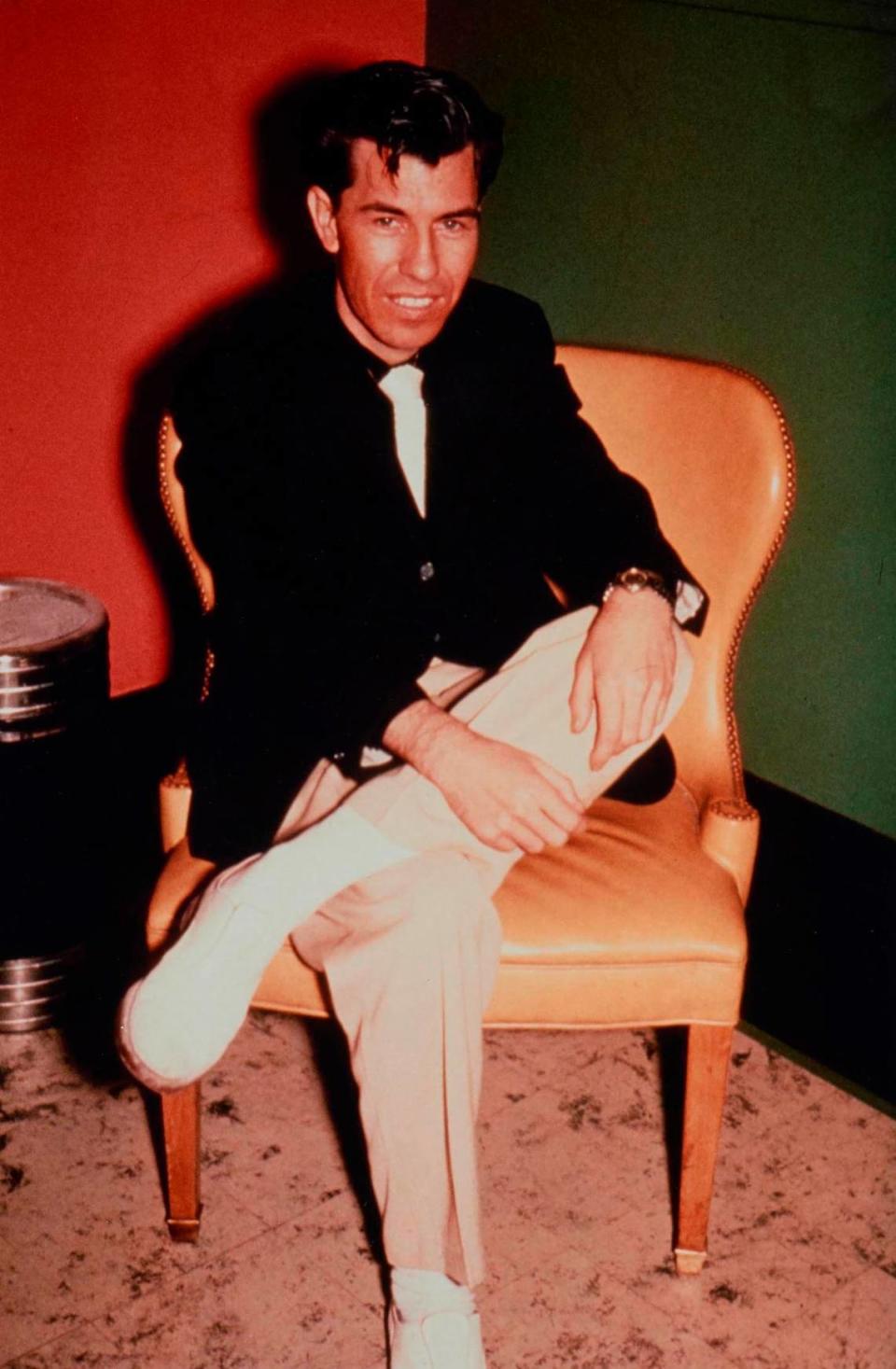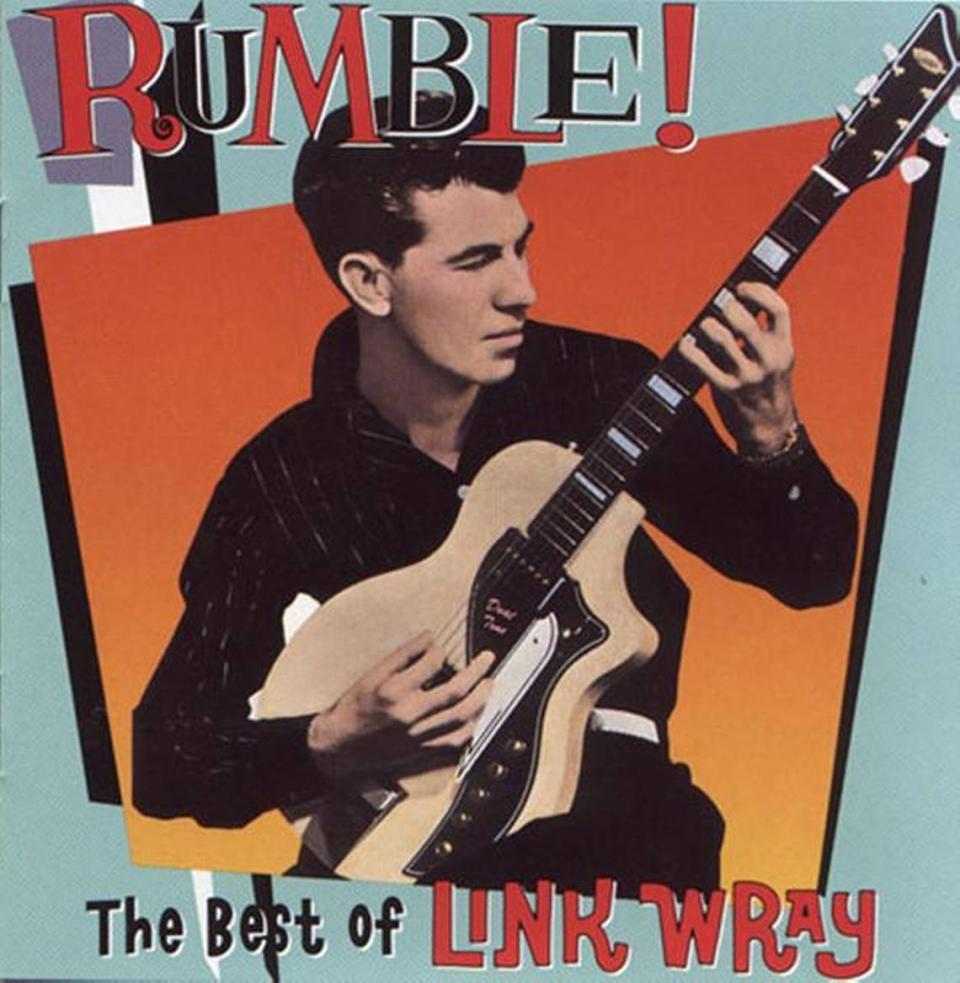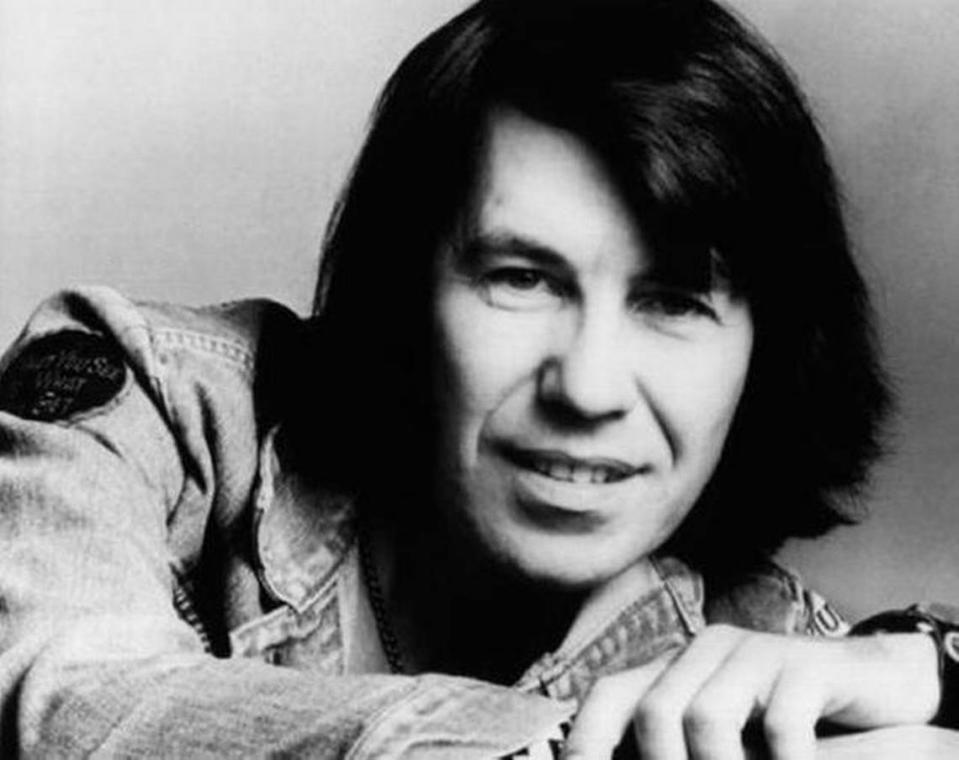From the archives: Link Wray belongs in the Rock & Roll Hall of Fame. Here’s why.
- Oops!Something went wrong.Please try again later.
This story was originally published in The News & Observer Nov. 23, 2013. On May 3, 2023, the Rock & Roll Hall of Fame announced Link Wray would be inducted in the Class of 2023 in a ceremony on Nov. 3.
The latest batch of Rock & Roll Hall of Fame nominees has plenty of chart-topping household names, including Kiss, Nirvana and Linda Ronstadt. But possibly the most influential name on the 16-act ballot is a more obscure figure: Dunn native Link Wray, the most important guitar player you’ve never heard of.
Much of his influence stems from a single song, “Rumble,” a 1958 hit that has turned up in everything from “The Sopranos” to Quentin Tarantino’s “Pulp Fiction.” Two-and-a-half minutes of hoodlum menace, “Rumble” is a deceptively simple instrumental with a strolling drumbeat and Wray’s dirty-sounding guitar.
Wray was also a low-brow fashion trend-setter, using stage outfits and guitars ordered out of a Sears-Roebuck catalog. But what lingers most is the distinctively raw tone of his power chords. To get his sound, Wray used a pencil to poke holes in his amplifier speakers.
It’s a sound lots of other guitar players have spent their careers trying to duplicate, including Dan Auerbach of The Black Keys and Led Zeppelin’s Jimmy Page. A memorable scene of the 2009 movie “It Might Get Loud” shows Page playing air guitar along to “Rumble” and calling it a personal turning point.
“So-called gifted guitarists always talk about how Link played so simply,” said John Custer, a producer whose credits include the Grammy-nominated metal band Corrosion of Conformity. “But I think it’s hilarious that none of them can come anywhere near Wray’s sonic presence, vibe or much-imitated cool. He is inimitable.”

Credit to Hambone
Wray, who died of heart problems in 2005 at age 76, was born Frederick Lincoln Wray Jr. in Dunn in 1929. Legend has it that he was introduced to his destiny at age 8, courtesy of an African-American circus guitarist known as Hambone, who showed the young man guitar basics and a few tricks.
“Daddy always gave Hambone credit until the day he died,” said Beth Wray, his oldest daughter.
During Wray’s early teenage years, his family moved to Portsmouth, Va., when his father got a job at the shipyards. Wray was three-quarters Shawnee Indian and later told an interview that racial tension had made life in Dunn “one big hell.”
Still, Beth Wray said her father was always proud of his roots in Dunn. He paid tribe to his childhood stomping grounds with “Black River Swamp,” a 1971 song inspired by an actual body of water near Dunn:
I can hear them bullfrogs croaking
In the blackness of the night
Calling me back to my childhood
Down here in Black River Swamp...
Once in Virginia, Wray began playing in bands with his brothers and also backing up country acts passing through the area. A military stint during the Korean War interrupted Wray’s career with dire results even though he never saw combat. Wray contracted tuberculosis and spent more than a year hospitalized, eventually losing a lung.

Roots of ‘Rumble’
By then, Wray was living in Washington, D.C., and married to the first of his four wives. After recovering, he resumed playing music up and down the East Coast. Young Beth, who was born in 1954, would sometimes get onstage as a child to dance to the music.
One night onstage in Fredericksburg, Va., the master of ceremonies asked Wray’s band to play “a stroll.” Nonplussed, Wray said he didn’t know any. But his drummer brother Doug started playing a deliberate backbeat, Link improvised some chords and solos, and “Rumble” was born — although the original title was “Oddball.” The crowd went wild, insisting the band play it repeatedly.
Retitled “Rumble” for its evocation of gang violence in the popular musical “West Side Story,” the recorded version went to No. 16 in 1958. Wray went on to have a few other chart hits, including 1959’s “Rawhide” and 1963’s “Jack The Ripper.” But “Rumble” would remain his calling card and credo for the rest of his career.
“He wouldn’t let nobody tell him how to play,” said daughter Beth. “When he was trying to make ‘Jack The Ripper,’ I remember him coming home talking about how the producers wanted to put an orchestra behind it. After hearing that one, I can’t imagine. But he played everything his way and lived that, too. He played music the way he wanted and continued rocking and rolling through the ’70s, ’80s, ’90s, up until the day he died.”

Link the expatriate
In the late 1970s, Wray hit the charts for the last time with rockabilly singer Robert Gordon on “Red Hot.” That was around the time Wray met his fourth wife Olive, with whom he moved to Denmark in the mid-1980s. He did not return to America for more than a decade, staying and playing in Europe.
In his absence stateside, Wray grew nothing but cooler as a series of movies kept his music in the air. Along with “Pulp Fiction,” Steven Spielberg’s “Independence Day” and Robert Rodriguez’s “Desperado” were among the films to make prominent use of his songs. Ray resumed touring the U.S. and returned a hero, frequently playing in America until his death in November 2005.
Rick Miller, guitarist of popular Chapel Hill roots-rock band Southern Culture on the Skids, shared bills with Wray a number of times. He got a chance to ask Wray “how he did it” (eliciting the priceless answer, “Heineken and vitamin-C”), and to compare notes on the cheap guitars they both played.
Then there was the New York City show the Skids closed by playing one of Wray’s more obscure tunes, “Turnpike USA.”
“I look over and Link’s on the side of the stage in his black leather, fist pumping,” Miller said. “That was cool, one of my all-time heroes watching me play one of his songs and digging it. Then he comes up afterward, grabs me and says, ‘That last song was awesome! Was it one of yours?’ ‘Link,’ I said, ‘that’s one of yours!’ ‘(Expletive) me, it shoulda been a hit!’”
Lobbying for the Hall
In recent years, local officials have tried to raise awareness of Wray’s connection to Dunn, a town of about 9,500 between Raleigh and Fayetteville. Dunn declared his birthday May 2 to be “Link Wray Day” in 2011 and debuted a music festival bearing his name in 2013. Band of Tribes, a band led by Wray’s grandson, played the festival last year and will do so again in 2014.
There’s also a movement to move his body back to Dunn, which Beth Wray hopes will happen.
“Dunn is where he belongs,” she said. “I just hope and pray that happens.”
Meanwhile, the Hall of Fame also seems like a fitting place for Wray. There’s been a grassroots movement to get him in for years, including a Facebook page called “Induct Link Wray into the Rock and Roll Hall of Fame.”
Wray made the final ballot for the first time in 2013, for the class to be inducted in 2014. As part of the rock hall’s voting process, there’s an online “fan ballot” where the public can vote. Those results will be taken into account for the top-five vote-getters.
But it doesn’t look like Wray will get any help from the fan vote. At last report, he was well out of the top-five with less than one-tenth the votes of Nirvana at No. 1. Ultimately, whether or not Wray gets into the Hall of Fame will be up to its board of directors.
“I think he’ll get in, by hook or by crook,” said Parke Puterbaugh, a music critic from Greensboro who writes biographies for the hall’s inductees. “Someone connected with the nominating board obviously recognizes what a significant contributor he was to the early rock ’n’ roll sound. The hall’s done a good job taking care of a lot of the early rock and r&b guys. I don’t know how he’s slipped past the radar this long.”
Miller is more blunt, saying it’s “a disgrace” Wray isn’t already in the hall.
“He should’ve been in on the very first vote,” Miller said. “He was The Guy as far as rock ’n’ roll guitar goes, and nobody else even comes close. All I can say is if it were up to musicians, he’d be in there.”

